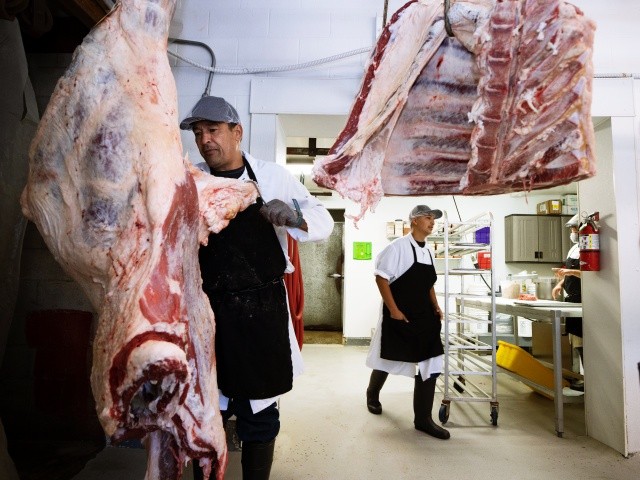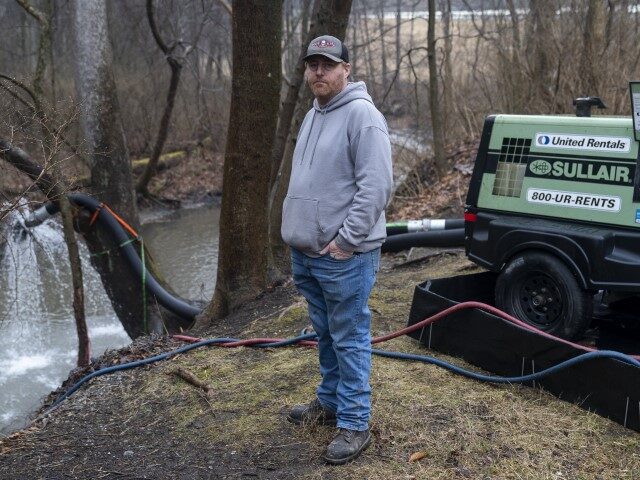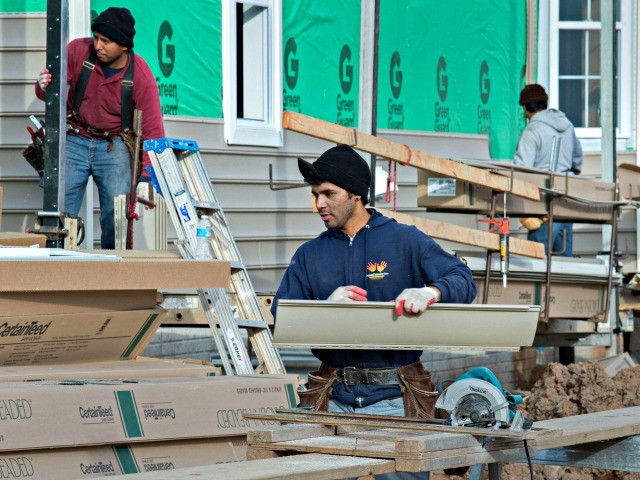State legislators are dodging corporate demands for more migration by pushing popular legislation to get sidelined Americans back into decent-paying jobs.
The political maneuvering was spotlighted at the annual meeting of the National Conference of State Legislatures (NCSL), held in Indianapolis from August 13-16.
Both GOP and Democratic legislators touted their plans and legislation that would help millions of sidelined and unemployed Americans to get off drugs and welfare, manage childcare, get trained, and find decent housing. Politicians know those pro-family policies are far more popular than businesses’ very unpopular pro-migration demands.
Drug addiction and mental health “not only keeps people out of the workforce, but it also affects people’s attendance and focus on the task at hand when somebody in their family is struggling,” said Indiana Sen. Michael Crider, who is the GOP’s majority whip in the state Senate. The August 22 report by Stateline.org noted:
The potential to improve worker productivity was one reason the legislature earlier this year near-unanimously approved Crider’s legislation that overhauled the state’s antiquated mental health system and aims to infuse $130 million more per year into services.
Housing is a major problem for New Hampshire employees, Democratic state Rep. Brian Sullivan told the NCSL according to the Stateline.org report:
“They are having huge problems being able to attract workers who then can find some place to live,” Sullivan said in an interview with Stateline. “They’re not bad jobs. But the cost of housing is so high that a lot of these people will say, ‘I can’t work here, I’ve got to go live somewhere where I can afford housing.’”
“We’re just not having enough babies,” said North Dakota Republican state Rep. Karen Karls told the meeting. But many Americans cannot juggle unpredictable work schedules with childcare, said Washington state Democrat Sen. Karen Keiser, according to the Pew-funded Stateline news site:
“There are so many workers who cannot work unpredictable schedules because they do not have reliable child care,” she said. “Well, hospitality has unpredictable schedules and so does health care. And those kinds of systemic problems are just running up against each other.”
In 2021, Washington state approved a $1.1 billion plan to make child care and early learning programs more affordable and accessible. This year, the legislature added more than $400 million in new funds to raise child care provider pay and increase subsidies for families over the next two years.
In Arkansas, the state’s GOP government is spending more to help high-school graduates learn a trade and are raising pay to hire better teachers, told the NCSL meeting:
Arkansas state Rep. Stephen Meeks, a Republican, pointed to the state’s Be Pro Be Proud campaign. An initiative led by the Associated Industries of Arkansas Foundation, it encourages young people to enter fields such as construction, railroading and manufacturing.
State leaders even hold a Draft Day, pairing graduating seniors enrolled in career and technical education courses with employers ready to hire them.
Business groups loudly insist they cannot find workers in a nation of at least 214 million working-age adults, of whom just 135 million are in full-time jobs. Quietly, they also admit that migrants help to suppress wages for Americans.
Without more workers, businesses will just have to train more Americans and raise their wages, complained Donnie Gibson, CEO at general engineering contractor Civil Werx in Nevada, PaysonRoundup.com reported on August 24:
“It’s an economic emergency,” Gibson said. “That’s a great argument for employing a motivated immigrant population.”
The share of Americans in full-time jobs has dropped over the last 30 years, partly because of the federal government’s support for outsourcing and migration, and its limp response to the resulting mass death and despair. The Center for Immigration Studies reported on August 21:
If the same share of U.S.-born men (16 to 64) were in the labor force in 2023 as in 1960 there would be 9.5 million more U.S.-born men in the labor force. Even if the share returned to the 2000 level, it would still add 4.8 million men to the labor force.
Amid the claimed shortage of workers, the federal government is downplaying efforts to block drug smuggling and is instead focused on safeguarding the flow of replacement migrants and trade over the U.S.-Mexican border.
The resulting drug problem is especially bad in the construction sector, according to an August 24 report in ConstructionDive.com:
Construction led all categories with a rate of 130.9 dea [per 200,000 people] ths, followed by accommodation and food services with 99.6.
On a more granular level, among construction and extraction occupations, the jobs with the highest overdose rates were roofers (177.4) drywall installers and tapers (175.1) and painters (162.1).
A combination of seasonal furloughs, demanding physical labor — which can lead to strain or injury resulting in a chemical dependency — and workplace culture that sometimes fails to address mental health directly impacts the drug overdose and suicide rate in construction.
Biden’s deputies, his business allies, and many federal legislators prioritize the easy and quick option of migration over family-friendly policies that would expand the workforce 20 years from today.
That short-term skew is driven by business leaders and their lobbyists, who spend much money demanding the government provide them with more compliant and cheap migrant workers.
For example, the business-backed American Business Immigration Council (ABIC) asked President Joe Biden in June to let governors fast-track foreigners into the jobs needed by Americans:
We respectfully request that you expand a special category of immigration permits for individuals who can fill positions where labor shortages exist, for people migrating to the U.S. and long-term immigrant contributors like Dreamers, farm workers, and essential workers.
Business leaders are trying to eliminate legal distinctions between Americans and migrant workers: “It is not that the workers do not exist. It is that many of them simply need legal permission to work,” said a June 14 op-ed by Woody Hunt, an ABIC leader and the senior chairman of Hunt Companies, a real-estate conglomerate in El Paso, Texas.
The ABIC lobby is composed of CEOs and investors who rely heavily on Latino laborers, and workers in construction, farming, food processing, healthcare, and landscaping. But it also works closely with FWD.us, which pushes to deliver more migrant workers into white-collar jobs.

SANTA PAULA, CALIFORNIA – MAY 21: Butchers at Old Fashion Country Butcher process meat as they work to meet increased demand due to Covid-19-related shortages. (Photo by Brent Stirton/Getty Images)
FWD.us’s wealthy coastal investors also comissioned a report urging the annual delivery of 100 migrants into 1,336 rural counties. “By increasing immigration, if only by a fraction for many rural counties, communities would experience a complete turnaround: more children, enough workers, and a promising future,” the report said.
However, each annual inflow of 133,600 new migrants would be required to stay in the area to prevent their migration to nearby cities, the report added.
Also, D.C. politics would likely block that rural inflow unless many additional migrants were also imported to urban locations in coastal states. That comprehensive deal would deliver many more migrants to the coasts and so minimize the incentives for coastal investors to invest in the migrants who move to the rural states.
In May 2022, GOP Senate candidate Katie Britt told Breitbart News:
Alabamians are disproportionately hurt by the immigration system right now. You’ve got two things going. First, continual driving down of wages [in Alabama]. Second, the coastal elites are able to fill their workforce needs [with immigrants] and we lose the opportunity to allow our workers to compete for those jobs [created by coastal investors].
Corporate lobbying is often unsuccessful. But it has blocked reforms in 2018 and 2020 that would have helped Americans earn higher wages and has used White House allies to supercharge migration under President Joe Biden.
Legislators in both parties want to avoid anger from voters and donors — and so they keep zig-zagging without doing much to help young Americans earn enough to raise a family. In Maine, Democrats zig towards employers and invite more migration. In Iowa and Nebraska, GOP legislators zig-zag between donors and anti-migration voters.
Biden’s post-2020 migration has flooded coastal states with new migrants and reduced pressure for wage gains. But migration has been lower in rural states. This helps to tighten the state’s labor markets. That tightness forces local companies to invest in the labor-saving, productivity-boosting technology that helps Americans earn higher wages.
Americans’ wages have also been helped by Florida’s GOP-led government crackdown on illegal migration. “The immigrants with legal status are in high demand, and they know it … [and] they want top dollar,” said Murrie Mehrer, the owner of a small landscaping firm in Lakeland, Florida. She added:
When you do find one, they want top dollar. We can’t afford to pay someone per day what the average yard pays us in a month … When you find someone that has all the credentials, get ready to pay them close to $200 per day. As a small business, we cannot afford that.
Tight labor markets help Americans pull more wages from employers, Washington state Senator Keiser told the NCSL meeting. “That’s good … because they have seen pay stagnation for the last 20 years.”
Extraction Migration
The federal government has long operated an unpopular economic policy of Extraction Migration. This colonialism-like policy extracts vast amounts of human resources from needy countries, reduces beneficial trade, and uses the imported workers, renters, and consumers to grow Wall Street and the economy.
The migrant inflow has successfully forced down Americans’ wages and also boosted rents and housing prices. The inflow has also pushed many native-born Americans out of careers in a wide variety of business sectors and contributed to the rising death rate of poor Americans.
The lethal policy also sucks jobs and wealth from heartland states by subsidizing coastal investors with a flood of low-wage workers, high-occupancy renters, and government-aided consumers.
The population inflow also reduces the political clout of native-born Americans, because the population replacement allows elites and the establishment to divorce themselves from the needs and interests of ordinary Americans.
In many speeches, border chief Alejandro Mayorkas says he is building a mass migration system to deliver workers to wealthy employers and investors and “equity” to poor foreigners. The nation’s border laws are subordinate to elite opinion about “the values of our country” Mayorkas claims.
Migration — and especially, labor migration — is unpopular among swing voters. A 54 percent majority of Americans say Biden is allowing a southern border invasion, according to an August 2022 poll commissioned by the left-of-center National Public Radio (NPR). The 54 percent “Invasion” majority included 76 percent of Republicans, 46 percent of independents, and even 40 percent of Democrats.


COMMENTS
Please let us know if you're having issues with commenting.